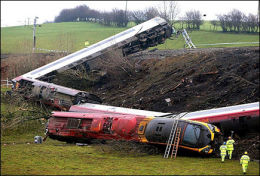Posted 15th October 2008 | No Comments
Charges dropped for two Grayrigg track workers

"Our two members and their families have been living under the shadow of suspicion for the best part of a year and the very least they deserve is an apology"
Two track workers arrested following the derailment of a Virgin Pendolino train near the village of Grayrigg, Cumbria have been released without charge. One died and 22 were injured in the derailment on 23 February 2007.
British Transport Police said that a third man will remain under police bail until November 3.
According to RMT general secretary Bob Crow: "Our two members and their families have been living under the shadow of suspicion for the best part of a year and the very least they deserve is an apology for arrests that should never have been made.
"We said last November that we were completely mystified by their arrest, which I am convinced amounted to nothing more than a fishing exercise and intimidation. Neither of the men was directly involved in maintenance on the points and neither has been involved in any disciplinary following the crash – and in fact no-one has been disciplined for anything directly connected to the tragedy.
"Both the RAIB interim report and Network Rail's own report have pointed clearly to management failings and lack of resources, and it is those structural failings that still need to be addressed.
"Network Rail's spending targets have been slashed by 30% over the last five years and we have raised concerns about the workloads placed on individuals on a number of occasions.
"NR is still dogged by inappropriate practices brought in by private contractors and there is still too much emphasis on getting things done quickly and cheaply rather than properly and safely.
"Those are the problems that need to be resolved, and we believe there still needs to be a joint public inquiry into Grayrigg and Potters Bar with a remit that includes the structure and continued fragmentation of the industry," he said.
A report by the Rail Accident Investigation Branch (RAIB) found that the derailment was caused by a faulty set of points.
A second report by Network Rail found lapses in the inspection regime, which led to the faults escaping detection.
